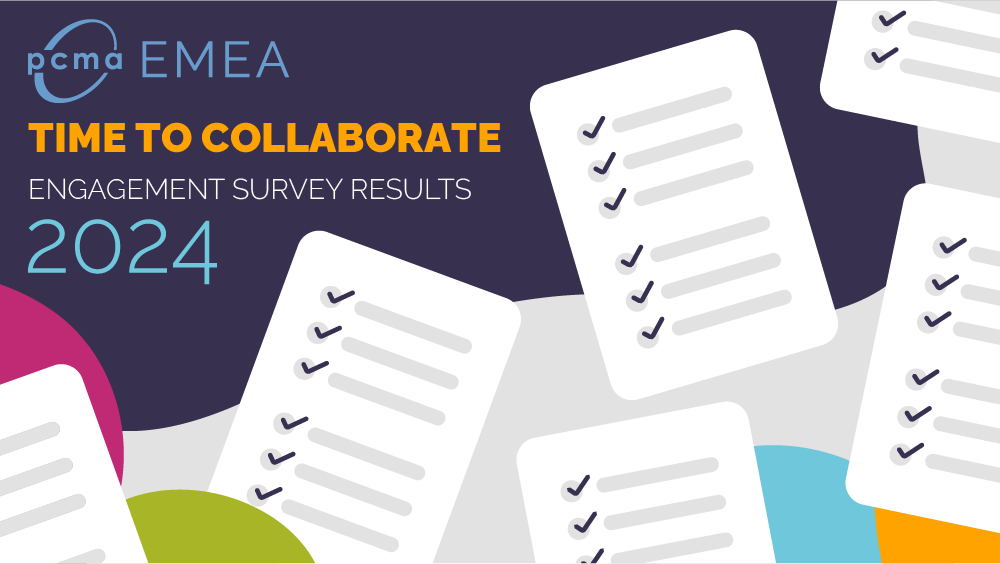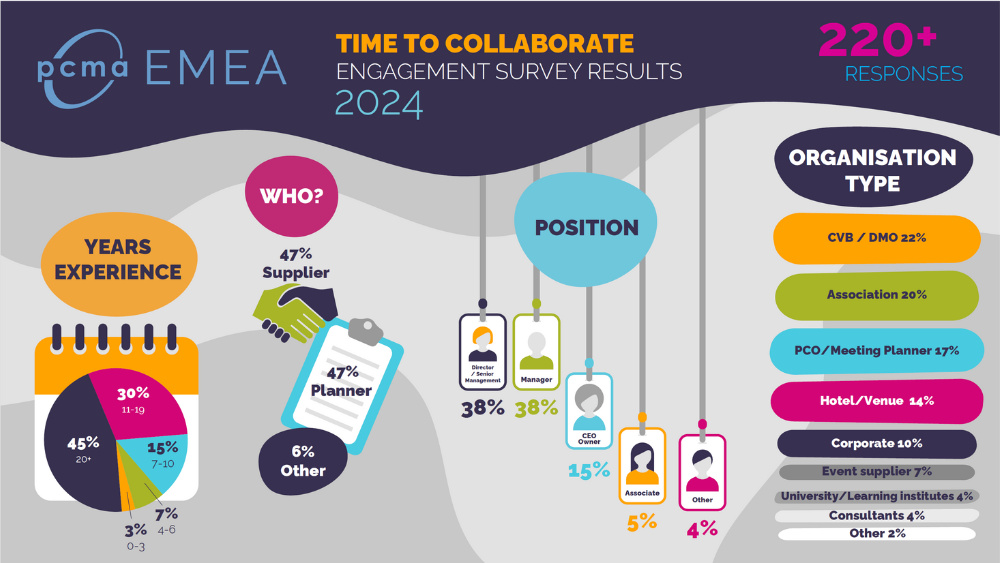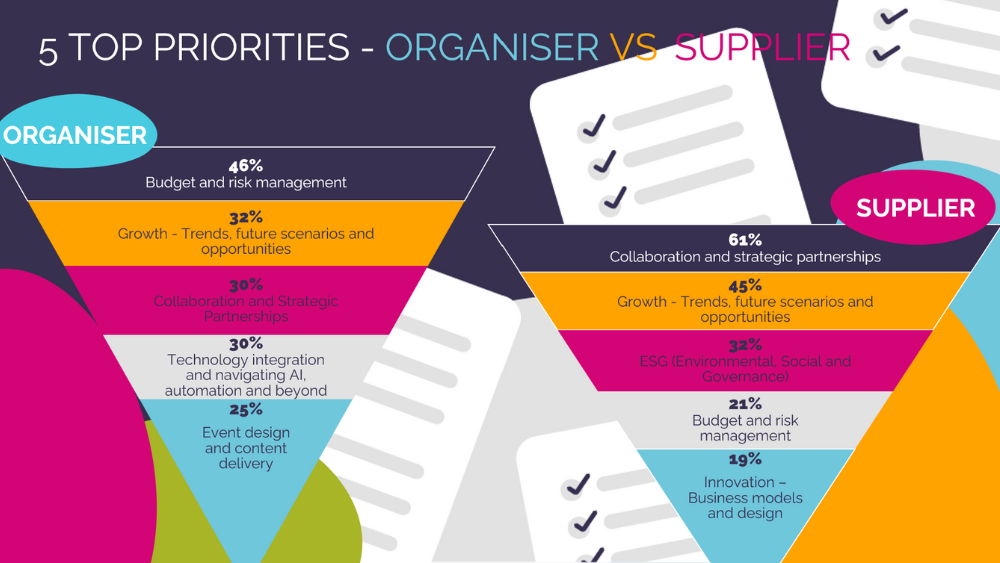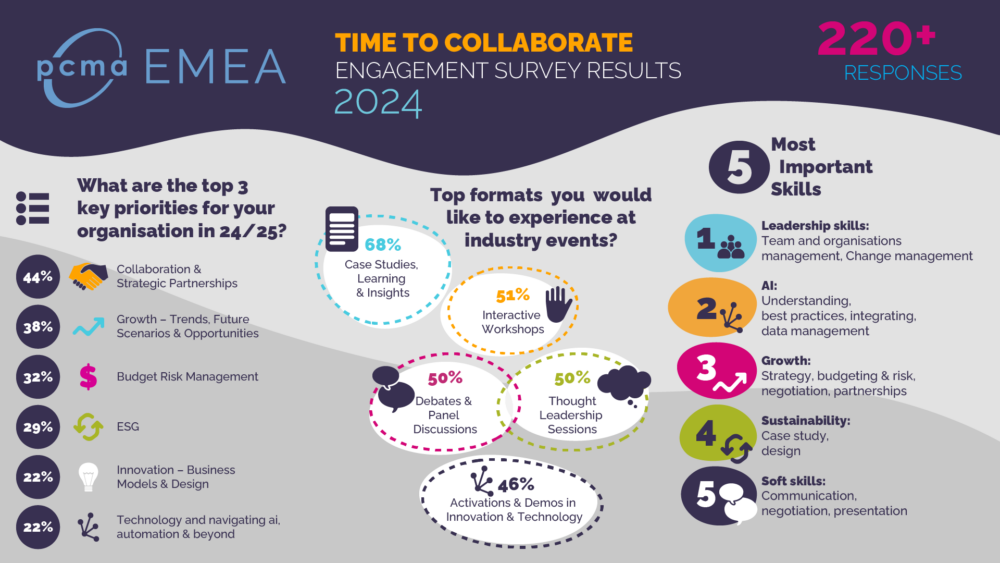
The top priority for the PCMA EMEA Engagement Survey respondents is collaboration and developing strategic partnerships.
Collaboration is critical in uncertain times, three global business strategists wrote this month in Harvard Business Review. Recent research suggests that when resources become limited, business leaders tend to become risk-averse and prioritize stability over innovation, according to the article. This, they said, is a mistake. “It’s precisely during these challenging times,” write the authors, “that the untapped potential of collaboration can be a game-changer.”
Businesses that collaborate with synergistic organizations that share the same values and customer targets, they write, thereby enable their teams to do more with less and unlock growth. For individuals, collaborating with others offers many benefits, including gaining “access to a broader resource pool, diverse knowledge bases,” they write, “and a wealth of life and professional experiences.” (Sounds like the value proposition for events, no?)
The 2024 PCMA EMEA Engagement Survey results could serve as Exhibit A for the HBR article — collaboration is a goal that pops up repeatedly in the responses of 223 business events industry professionals. Survey participants were almost evenly split between suppliers and planners, and the majority of them reside in Europe.

Conducted between December 2023 and January 2024, the survey asked business events professionals to identify their biggest challenges. Their responses are similar to last year’s survey, with rising costs cited often. But resource management and workload challenges were mentioned more often this year than financial challenges. And industry evolution and change were also top of mind — those that were wished for and those that have been thrust upon respondents, with the fast pace of tech and adapting to AI specifically mentioned in the latter category.
According to the logic presented in the HBR article, given such an uncertain environment and extensive resource and time constraints, the top priority for the organizations that the respondents work for is collaboration and developing strategic partnerships. Moreover, three out of five supplier respondents cited collaboration and strategic partnerships as a priority, followed by growth — trends, future scenarios, and opportunities (45 percent); environmental, social, and governance (32 percent); budget and risk management (21 percent); and innovation in business models and design (19 percent).
Organizers weighted their priorities differently and had two other priorities not shared by suppliers. Looking at their priorities as an inverted pyramid, budget and risk management is at the top (46 percent); growth follows (32 percent); the third and fourth priorities, cited by three out of 10, were collaboration and strategic partnerships and technology integration (including navigating AI). One quarter identified event design and content delivery as a priority.

Organizers said the five most important skills they are focusing on this year are leadership/change management; understanding best practices around and implementing AI; growth — strategy, budgeting, risk, negotiation, and partnerships; sustainability; and soft skills (i.e., communication, negotiation, and presentation skills).
When respondents were asked in an open-ended question to name one thing they would like to see at an industry event, networking and collaboration was among the top three most mentioned areas, in the same bucket as peer learning, knowledge sharing, and opportunities for meaningful engagement and exchange.
Topping that wish list is a focus on sustainability and diversity, equity, and inclusion. From an environmental standpoint, survey participants want to see sustainable F&B options and initiatives at events and they want to understand how the event reduced its carbon footprint. They are looking for DEI to be front and center in terms of attendee and speaker representation and in sharing insights that carry DEI forward. They also want industry events to help them understand how new technologies, particularly AI, can be harnessed in their roles, with demonstrations, discussions, and case-study examples of AI in action.
Case studies, in fact, with their associated learnings and insights, topped suppliers’ and organizers’ preferred event experience formats. Following case studies were debates and panel discussions, interactive workshops, and thought-leadership sessions — three formats that were neck and neck and reflect the desire to learn from and with each other and to co-create the future of the events industry.
“Although the results have not revealed anything unexpected,” said Jaimé Bennett, PCMA’s managing director, EMEA, “we continue to welcome the engagement of our regional community and their honest feedback. Their willingness to share with us and each other to foster the collaboration they want to see take place in the business events industry is inspiring. It is only through continual dialogue, engagement, and creating platforms to exchange ideas and experiences with one another that we can understand and evolve — not only as individuals, but as teams, organizations, and the industry as a whole.”
Who They Are
One out of five respondents work for an association; 17 percent identified as a PCO/meeting planner/DMC; another 17 percent work at a CVB; and 14 percent are employed at a hotel or venue. Almost nine out of 10 live in Europe, 5 percent reside in the Middle East and 4 percent live in North America. The largest portion of respondents — 45 percent — have more than 20 years of experience in the industry; 30 percent have more than one but less than two decades of experience; 15 percent have 7-10 years of experience; and 10 percent have spent six or fewer years working in the business events industry.
In terms of roles, nearly two out of five survey takers are managers and nearly three out of 10 are at the director level. Fifteen percent occupy the C-suite and 9 percent are in the VP category.
Michelle Russell is editor in chief of Convene.

